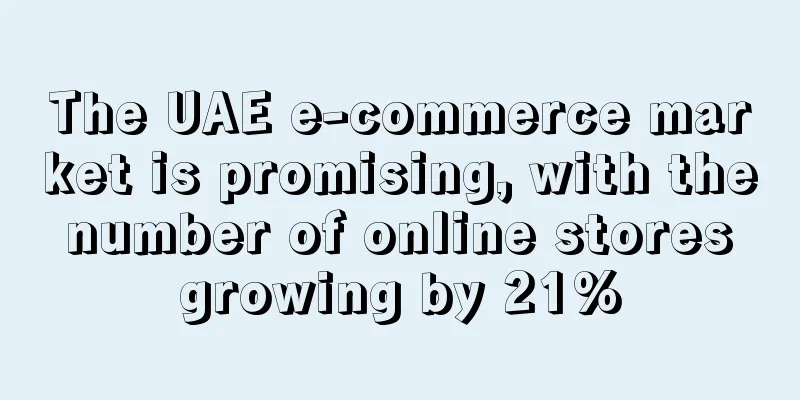The UAE e-commerce market is promising, with the number of online stores growing by 21%

|
“As Covid-19 kept consumers around the world at home, nearly everything from groceries to gardening supplies was bought online,” the report said. “To put it another way: e-commerce accounted for about $1 in every $5 spent on retail in 2020, up from about $1 in every $7 in 2019.”
According to the Dubai Future Foundation, before the COVID-19 pandemic, the UAE's digital economy contributed 4.3% to the country's GDP. Based on current trends, the country's e-commerce industry will reach $62.8 billion by 2023. The report said that the growth in UAE e-commerce consumer spending was mainly due to a 21% surge in the number of online stores.
The Mastercard report noted that approximately 20% to 30% of the global coronavirus-related digital shift is expected to be permanent.
The Gulf region’s booming regional online shopping market is expected to grow by more than a third this year to a total of $30 billion, according to a report by Wamda and MIT.
By the end of 2020, the region's e-commerce market will be worth $22 billion, driven by online shoppers from Saudi Arabia, Egypt and the UAE. According to the study, these three countries account for 80% of the region's overall e-commerce market. By 2024, Saudi Arabia's market is expected to reach $8.2 billion.
Mastercard analysis shows that consumers around the world are shopping on more websites and online marketplaces than ever before, reflecting a wider range of consumer choice. Residents of countries such as Italy and Saudi Arabia are 33% more likely to shop in online stores on average, followed by Russia (29%), the United Kingdom (22%) and the United Arab Emirates (21%).
“While consumers were stuck at home, their money was traveling far and wide because of e-commerce,” said Bricklin Dwyer, Mastercard’s chief economist and director of Mastercard Economics. “This has significant implications, and countries and companies that prioritize digitalization will continue to gain. Our analysis shows that even the smallest businesses are seeing gains after shifting to digital.”
Essential retail sectors, which had the smallest digital market share before the crisis, have seen some of the largest gains as consumers adjust. As new consumer habits take hold and given the lower user base before the pandemic, experts expect that globally, 70% to 80% of grocery e-commerce will remain in the long term.
With global international e-commerce growing 25% to 30% during the pandemic, consumers increased their e-commerce footprint, purchasing up to 30% more items from online retailers, the report said. middle East |
Recommend
What is smartproxy? smartproxy Review, Features
Smartproxy is a public data access platform curren...
By 2025, UK online shopping home delivery alone will increase to £20 billion
New research from e-commerce delivery technology ...
U.S. trucking demand drops sharply as retailers wait for more orders
According to data released by FreightWaves , a tr...
What do Southeast Asians love to buy? Here are some of the potential products on Lazada in 2021...
2021 has officially begun. The Southeast Asian ma...
Annual revenue exceeds $1 billion, and Yeti in the United States is making a fortune
The COVID-19 pandemic has driven a shift toward a...
What is Pangolin? Pangolin Review, Features
Pangolin is a global developer growth platform th...
What is Fuhuang Meiyun? Fuhuang Meiyun Review, Features
Fuhuang International Trade and Logistics Co., Ltd...
Alibaba International Station released the September cross-border index: New overseas consumption concepts are taking shape, and "good enough" makes second-hand mobile phones more attractive than new iPhones
Recently, Alibaba International Station released ...
PayPal updates its Seller Protection Program, requiring sellers to provide tracking numbers
Recently, PayPal in the United States has made po...
U.S. consumer online shopping trends for the first quarter are released, and Amazon still dominates
The data shows that this report surveyed the beha...
With sales exceeding 2.2 billion, pet brand chewy grew 24% in Q3!
Recently, the American pet brand Chewy announced ...
Shein and Temu are popular in the United States, giving Amazon a headache
According to foreign media reports, affected by i...
eBay takes a different approach to compete with Amazon
Amazon , Walmart, and Target have all launched su...
What is Snapdeal? Snapdeal Review, Features
Snapdeal is a well-known e-commerce platform in I...
It has jumped to the top 5 of the best-selling list in just 2 months. The small bottle opener is a hot seller on Amazon!
As we all know, the outbreak of the epidemic has ...









